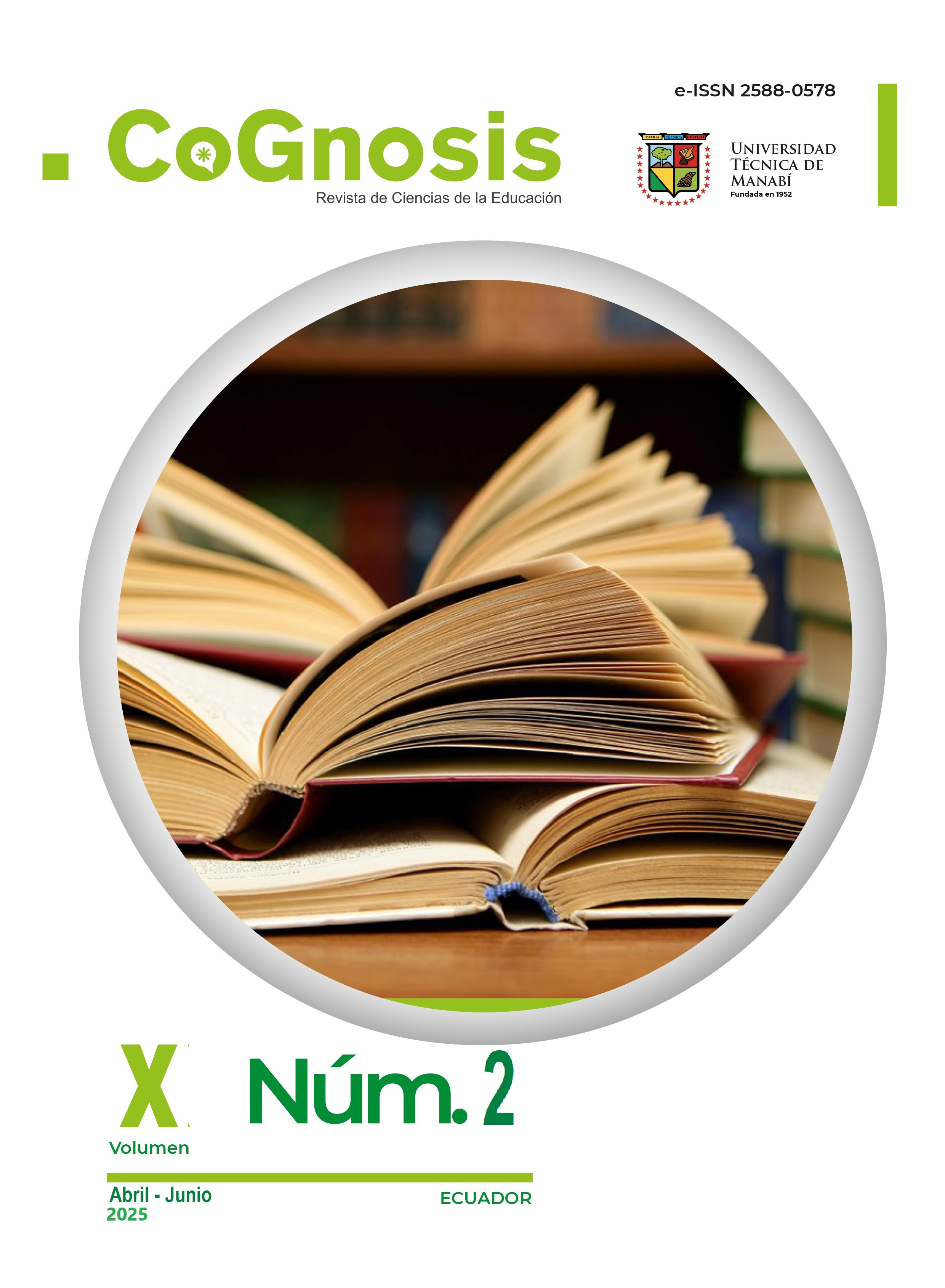The challenges of teaching mathematical thinking in primary education: the New Mexican School
Los retos de la enseñanza del pensamiento matemático en educación primaria: la Nueva Escuela Mexicana
DOI:
https://doi.org/10.33936/cognosis.v10i2.7545Abstract
The general objective of this scientific publication article is to promote the findings found in the teaching of mathematics, focused on the development of mathematical thinking, where the reader can acquire a different perspective on how to conceive the idea of developing new didactic methodologies, capable of enhancing cognitive development oriented to mathematical thinking. The search was carried out in different contemporary bibliographic sources, starting from psycho-pedagogical, socio-emotional, and humanistic approaches that gave direction to the research, thus considering Project-Based Learning, playful and inclusive learning environments, the correct use of technology applied to education, the innovative perspective of mathematical thinking, and the challenge that teaching must teach mathematics in the 21st century. This scientific publication was based on the qualitative methodological approach, where the contributions strengthened the development of educational science focused on mathematical thinking, the findings showed the difficulties and challenges in teaching mathematics and mathematical thinking, being clear about the difficulty presented by the students in solving mathematical problems in real situations, however, this helps to situate the teaching work and how challenging it is to teach mathematical thinking to a second grade child. The results showed a reflection on the importance of comprehensive training in students, mobilizing knowledge and its application to achieve said training.
KEYWORDS: mathematical thinking; innovation; game; teaching.
Downloads
References
Monroy Andrade, J. (2024). El uso de las nuevas tecnologías en la enseñanza de las Matemáticas: Una revisión sistemática. Tecnología, Ciencia y Educación, 28, 115–140. https://doi.org/10.51302/tce.2024.18987Dialnet+3ResearchGate+3Revista Tecnología, Ciencia y Educación+3
Arias, O., & Adrián, A. (2020). Aprender Matemática en el siglo XXI: A sumar con tecnología. Banco Interamericano de Desarrollo. https://publications.iadb.org/es/aprender-matematica-en-el-siglo-xxi-sumar-con-tecnologia
Broitman, C., Escobar, M., & Ponce, H. (2017). Enseñar a estudiar Matemáticas en la escuela primaria. Universidad Nacional de La Plata. https://libros.unlp.edu.ar/index.php/unlp/catalog/book/1387libros.unlp.edu.ar
Cantoral, R., Farfán, R. M., & Cordero, F. (2005). Desarrollo del pensamiento matemático. Trillas. https://www.amazon.com/Desarrollo-pensamiento-matematico-Development-mathematical/dp/9682472032Amazon
Diego, M., & Chacón Rebollo, D. T. (2020). Libro blanco de las Matemáticas. Centro de Estudios Ramón Areces. https://www.cerareces.es/libros/libro-blanco-de-las-matematicas/
Comisión Nacional para la Mejora Continua de la Educación. (2020). Las Matemáticas en 1° y 2° grados de educación primaria. MEJOREDU. https://www.mejoredu.gob.mx
Fernández, R. A. (2021). Didáctica de las Matemáticas. Universidad Nacional de Educación. https://libros.unae.edu.ec/index.php/editorialUNAE/catalog/book/Didactica-de-las-matematicaslibros.unae.edu.ec+1UNAE+1
Godino, J. D., Batanero, C., & Font, V. (2004). Fundamentos de la enseñanza y el aprendizaje de las Matemáticas para maestros. Universidad de Granada. https://digibug.ugr.es/handle/10481/95591Studocu+2Digibug+2Google Books+2
Hernández, L., Montiel, G., & Slisko, J. (2020). Tendencias en la educación matemática 2020. Benemérita Universidad Autónoma de Puebla. https://www.researchgate.net/publication/347503830_Tendencias_en_la_educacion_matematica_2020ResearchGate
Lorente, L. M. (2022). Investigación y diseño del currículo por competencias: El enfoque STEM. Octaedro. https://octaedro.com/libro/investigacion-y-diseno-del-curriculo-por-competencias-el-enfoque-stem/Octaedro
Macías, A. B. (2022). La metodología didáctica como barrera al aprendizaje y la participación en el horizonte de una escuela inclusiva. UPD. https://www.researchgate.net/publication/373116313_La_metodologia_didactica_como_barrera_para_el_aprendizaje_y_la_participacion_en_el_horizonte_de_una_escuela_inclusivaResearchGate
Martínez, B., & Sánchez, J. (2016). Didáctica de las Matemáticas en educación infantil. Ediciones La Rioja.
Riofrío, O. G., & Matías, J. (2023). Ambientes de aprendizaje: Las tecnologías de la información y comunicación en la formación de nuevos escenarios. Universidad Técnica de Machala.
Sánchez, M. A., Conejo, L., & Muñoz, J. M. (2019). Aprendizaje y enseñanza de las Matemáticas. Ediciones Madrid.
Secretaría de Educación Pública. (2022). Plan de estudio para la educación preescolar, primaria y secundaria 2022. SEP. https://www.gob.mx/cms/uploads/attachment/file/725542/Plan_de_Estudio_2022.pdf
Secretaría de Educación Pública. (2024). Plan de estudio para la educación preescolar, primaria y secundaria 2022. SEP.
Tobón, S. (2019). Los nuevos retos de la educación. Corporación CIMTED. https://cimted.org/wp-content/uploads/2019/10/Los-nuevos-retos-de-la-educacion.pdf
UNESCO. (2023). Technology in education: A tool on whose terms? UNESCO. https://unesdoc.unesco.org/ark:/48223/pf0000385527
UNICEF. (2018). Aprendizaje a través del juego. The LEGO Foundation. https://www.unicef.org/es/aprendizaje-traves-del-juego
Vallejo, C. A. (2021). La enseñanza del cálculo, las ciencias y las Matemáticas. Profesionales de la Edición A.C.
Published
How to Cite
Issue
Section
License
Copyright (c) 2025 Ulises . Mestre Gómez

This work is licensed under a Creative Commons Attribution-NonCommercial-ShareAlike 4.0 International License.






















